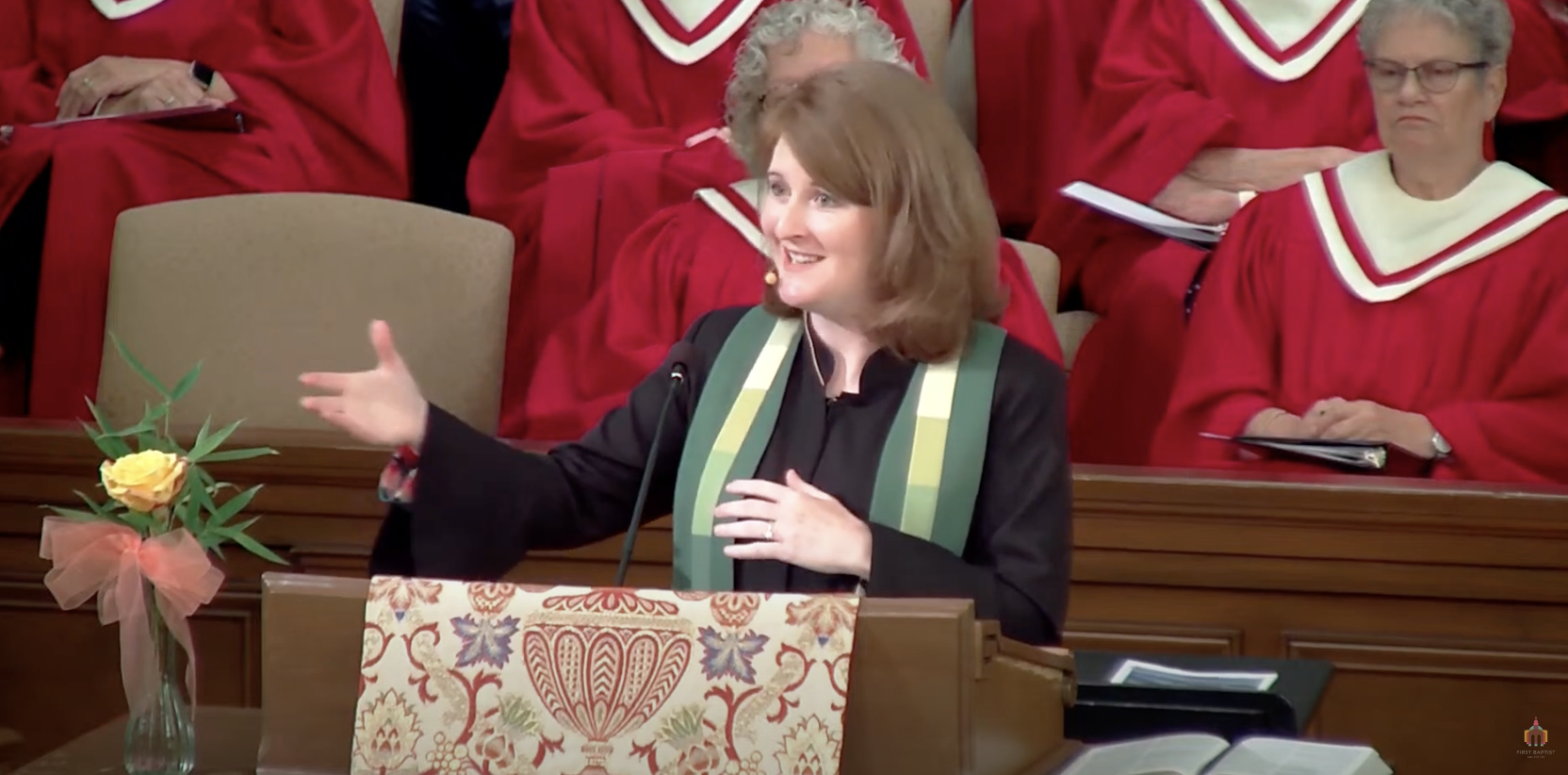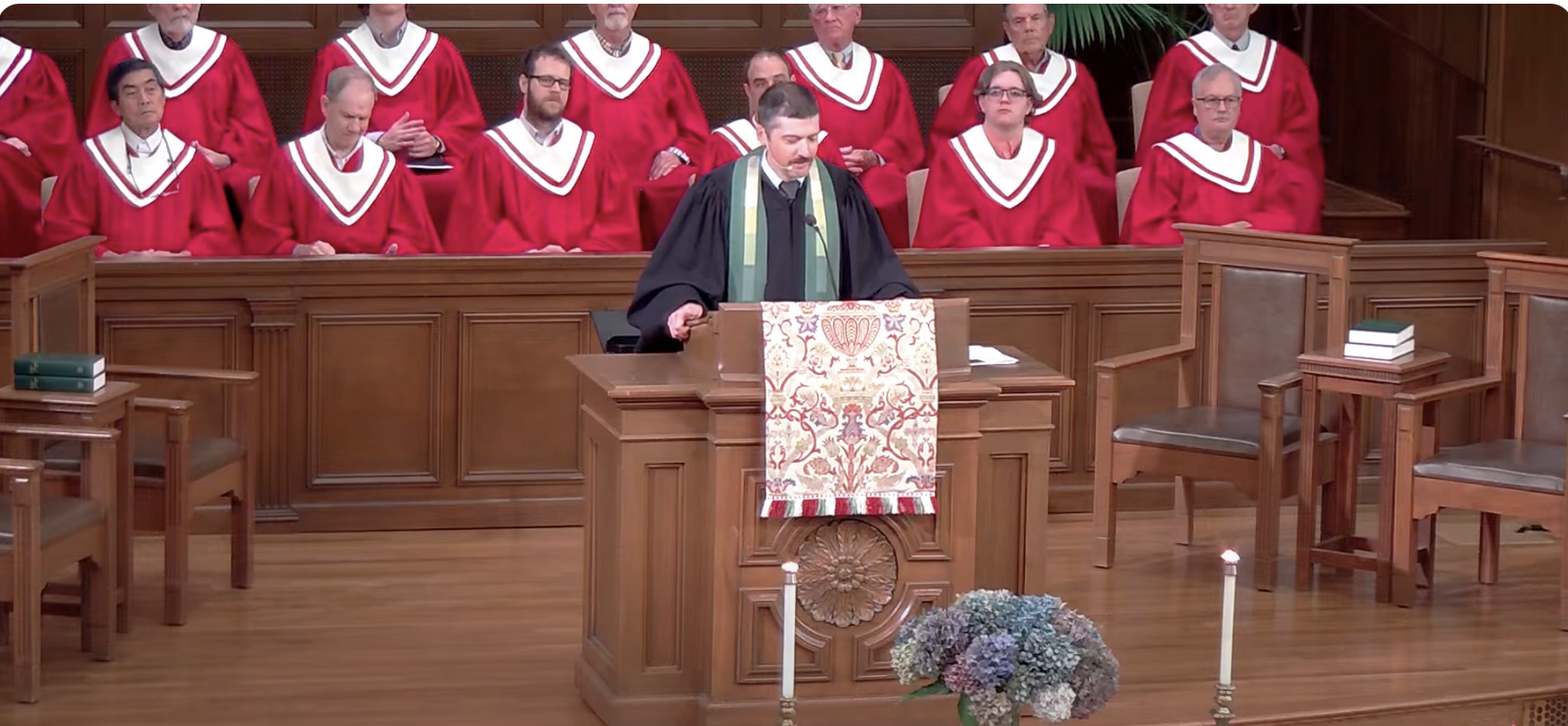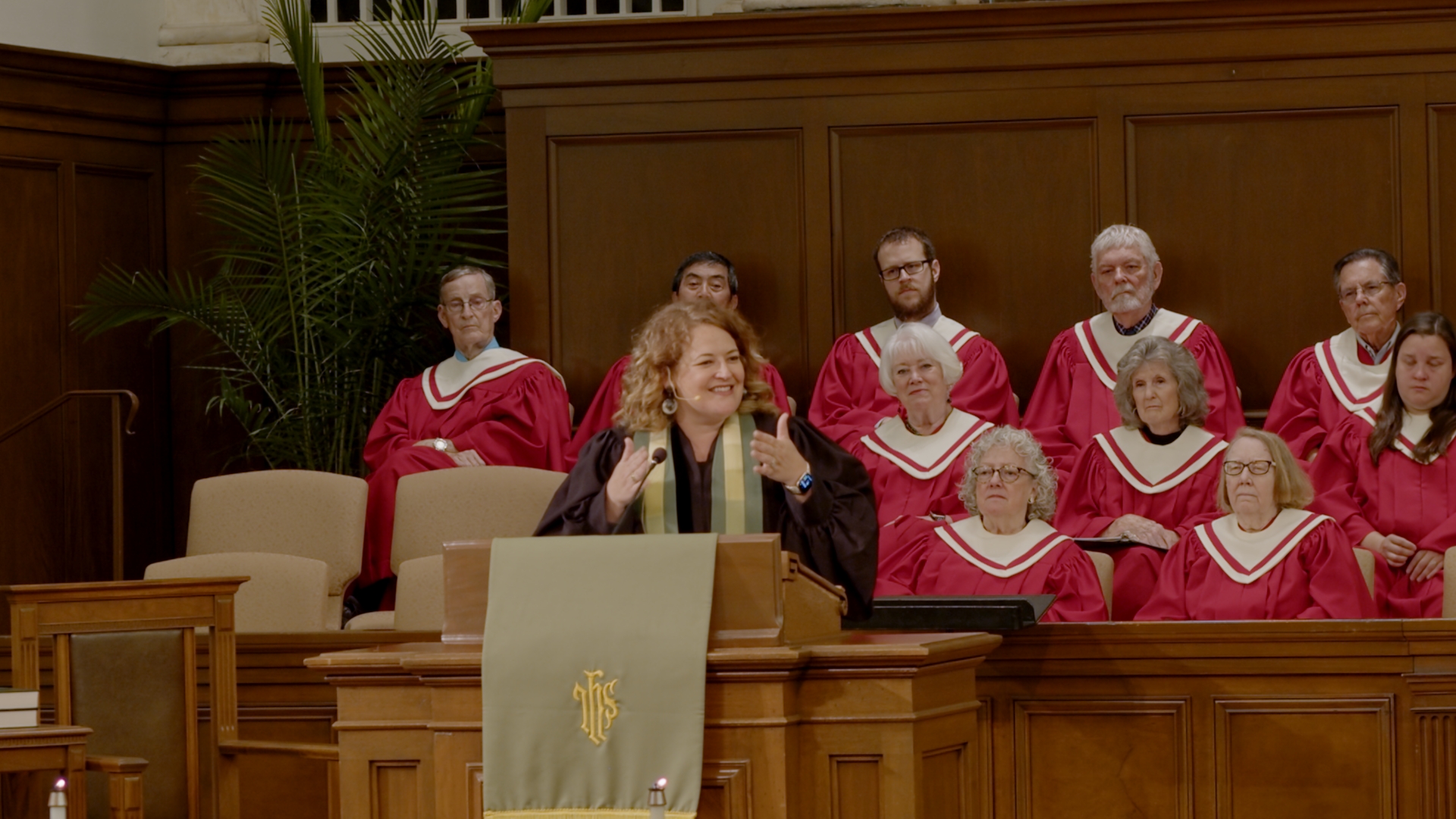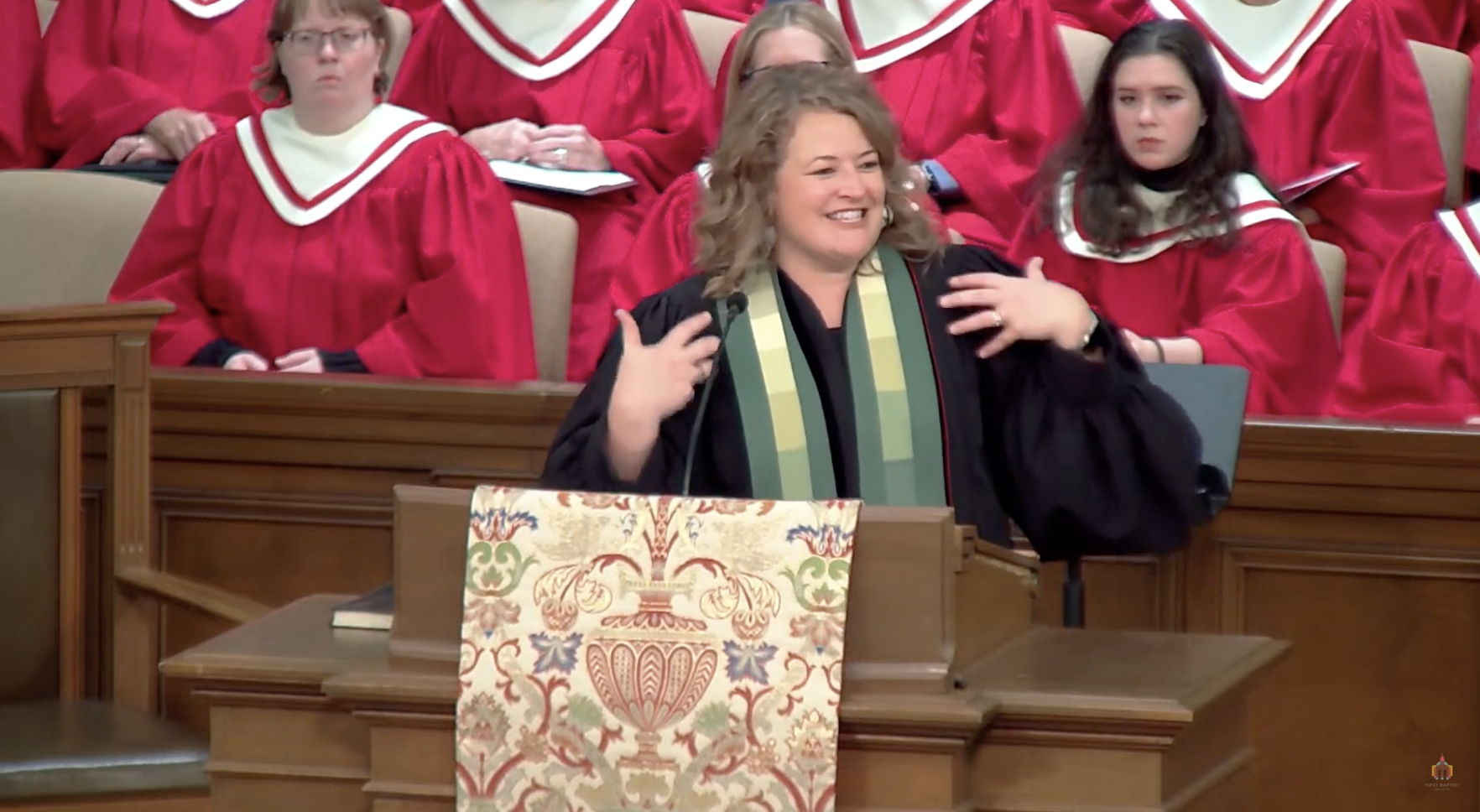I.When you first look at the painting, you’re not entirely sure what you see. On a fairly dim background sits a woman, alone and blindfolded. As you look more closely, you realize that she’s sitting on top of a globe, playing a lyre, which is like a smaller version of a harp. But it’s not any lyre, for this one has only a single string remaining.
English painter George Frederic Watts’ 1886 painting was widely panned upon its creation, though his critics did appreciate his use of color. It was cheaply reproduced in the early 1900s, and grew in its popularity when Teddy Roosevelt liked it so much, he insisted that it hang in his home in New York. It then went on to inspire a sermon by Dr. King, and from there, politicians and preachers and poets alike.
(I learned of this painting after the worship guide had already been printed for today, so please Google it when you get home!) Perhaps this painting made such an impact, not just because of the color or the subject, but because of the painting’s name: Hope. Hope, from a woman whose clothes are rags. Hope, in her suffering and sadness. Hope, when her harp had but one string left. One preacher said, it looked like “the audacity to make music and praise God … To take the one string you have left and to have the audacity to hope.”1
II.We meet Jesus back in the unfolding story of his ministry. As you remember from past weeks, Jesus has crisscrossed the Sea of Galilee to teach and to heal. He’s back on the side of the sea, crowds around him, yearning for the hope he provides.
As Mark is wont to do, there are two stories to unpack in today’s text. “The Markan sandwich,” scholars call this technique of starting one story, interrupting it with another, and then going back to conclude the first one. The stories inform each other, he seems to tell us.
This pair of miracle stories we hear today begins with Jairus, the synagogue leader whose 12 year-old daughter is on her deathbed. Jairus’s role in the community was significant. He was a respected elder, one who followed the rules, was known and highly regarded. We’ll later learn that his daughter has her own room in their house, a clear sign of their family’s wealth and privilege. And yet, in this precise moment of need, in all his agitation and distress, any norms or pretenses that would keep Jairus in his expected place have been all but abandoned. The thing he most hoped he could control was now on the verge of being lost. Instead, Jairus presses his way to Jesus up front, collapses at Jesus’ feet, begs Jesus repeatedly to come to his daughter’s aid. There is no limit to what a loving parent will do to save their beloved child’s life, you see.
Jesus agreed to go with Jairus, but along the way, the story is interrupted. Another act of desperation, this time from a woman whose menstrual bleeding had plagued her. For 12 long years, she has been considered ritually unclean. That meant no entering the temple, no touching others or being touched without attaching her uncleanliness to another. Isolation and loneliness were her daily truth, and not one of the physicians she spent her years and her money to see could stop the hemorraghing. She’s so overlooked in her community, so marginalized by her society, Mark doesn’t even give her a name. And yet, in this precise moment of need, in all her agitation and distress, any norms or pretenses that would keep the woman in her expected place away from others have been all but abandoned. The thing she most hoped she could control had spiraled her into poverty and crisis. Instead, she presses her way to Jesus from behind, risking the crowd and reaching for just a brush of her fingers to his cloak. There is no limit to what a distressed and weary one will do to finally find relief, you see.
III. We might call their determination, noteworthy, or their desperation, clear. But I want us to consider today the power of their hope. The hope that drives them from their homes and habits. The hope that refuses to let shame or fear shut them down. The hope that, though they may not know the outcome will be, they know that reaching toward Jesus is the journey, and the right next step. The hope that leads them directly to the Son of God. The hope we can call audacious.
Audacious hope is a farther-reaching hope, one that knows that wholeness and reconciliation and life abundant have a longer horizon. Audacious hope is what Dr. King called that long arc bending toward justice. It takes time and patience and attentiveness and care. Augustine once said: “Hope has two lovely daughters: anger and courage. Anger at the way things are, and courage to change them.” Of this, poet Padraig O’Tuama says, “I think that if the body has two wise daughters then they are loneliness and vulnerability. Loneliness in order to face your true self and vulnerability enough to tell the story to others.”2
This story today of two daughters, two bodies in need, is a story of hope. Despite the differences in these stories, their parallels give us clues for how we might understand them. For not only does Jesus heal two women, but he defies norms in the process. He comes near to the suffering, and holds the hand of the dying. He restores them to their communities, and gives new life in the face of death. To both who knew anger and courage, who lived loneliness and vulnerability, Jesus offers the gift of new life. And with one string of their harp remaining, they made music. They reached toward God revealed in Jesus, trusting that regardless of the outcome, there was hope to be found in the reaching. And they did.
As the story continues, on the way to attend one woman, Jesus heals another. The gospel tells us that “immediately her flow of blood stopped, and she felt in her body that she was healed of her disease.” And just as immediately, Jesus knew. He felt that something had happened, that some power had left him and entered another. “Who touched my cloak?,” he asked the disciples. You can imagine their astonishment. “What do you mean, who touched your cloak? Do you see how many people are out here today? We’re pressed from every side!”
I have to wonder if he felt her audacious hope, her willingness to risk anger and courage and loneliness and vulnerability to reach his way. For when she fell down before him, he offers blessing: “daughter, your faith has made you well.” Not her certainty or her cynicism, not her perfection or her productivity. Her faith, which we might call today, hope.
Perhaps her hope stayed with Jesus in his path to Jairus’s house. In the commotion of the crowd, a word rang out: “she is dead! Why trouble the leader any further?” Perhaps Jesus recognized in Jairus an audacious hope, his willingness to risk anger and courage and loneliness and vulnerability to come his way. “Do not fear, only believe,” he says. “Talitha cum,” Jesus says to Jairus’s daughter at her bedside. “Little girl, get up,” and she did. Not “do everything right,” or “do just as I say.” Not “tell everyone” or “change your life.” Rather, believe. Rise. Both which we might call today, hope.
IV.You know, when I picked my sermon title for today a number of weeks ago, I wouldn’t have imagined – nor would anyone else, I bet – that just days before the Fourth of July in this election year, we’d have one candidate who had become a convicted felon and another who is being pressured at every level to drop out. Given what we’ve heard in news coverage over these past weeks, I think it’s fair to characterize our national mood as, well, stressed. No matter which candidate you plan to vote for, I trust we’re all stressed about
this upcoming election because we know how much it matters! The topics at the ballot box are of ultimate significance: how we live, how we afford to live, how we educate our kids and care for our underserved, how we act on the world’s stage and within the innermost parts of our being, how our rights are upheld and national interests are upheld and our planet’s ultimate health is upheld. At our best, these concerns drive us to a higher, truer, more beautiful way to live. At our worst, they stress us out. They allow cynicism and even fatalism to take over and render us a despairing whole.
Into this reality, we think: we have no hope! What even is audacious hope? What will it do in this sweet land of liberty? Will it even matter? Will it count? How can our anger and our fear move toward courage for the road that lies ahead?
Beyond this country, the land that we love, what even is audacious hope in this life? What is audacious hope in the face of a terminal diagnosis or a trauma we cannot shake? What is audacious hope when you are drowning in debt or when you learn the family secret that utterly dismantles your sense of the world? Will audacious hope even matter in this life? Will it count? And when we lose hope, how then do we reach for Jesus despite it all?
Friends, the good news of the gospel – the good news of Jesus – the good news that we can bring within our country for such a time as this – is that we hope audaciously, in part, because this isn’t the end. We hope, because we know where God is — NEAR, right in the midst of it with us, making all things new. We hope, because we love and are loved. We hope, because we know that God is not done, because we see the world as it is and still long for the world as we hope it to be. We hope, because we have caught a glimpse of justice that rolls down like waters and righteousness like an ever flowing stream. We hope, because we’ve seen grace so amazing and forgiveness that welcomes the prodigal home again. We hope, amidst ordinary to do lists and worrisome medical tests, aging parents who never remember our names and bosses who think we never do anything right. We hope, because we know that the God who comes near to us in Jesus promises to stay close: close enough as our hand upon his cloak, close enough as his hand reaching toward up with a call to rise, close enough as an empty tomb.
Hope is not optimism, nor is it fatalism. Rather, it’s like Sam Wells once said, “Hope is not a wilful, taunting, reckless demand that God make an arbitrary alteration in the course of events. It is a faithful, patient expectation that God will, over time, make present the relations and conditions of the kingdom to those who in word and action anticipate its coming.”3
You know, I wonder if the miracle we hear in these stories wasn’t just the healing. Rather, what if the miracle was in the hoping?
Or in the words of Jan Richardson: “So may we know the hope that is not just for someday but for this day—here, now, in this moment that opens to us: hope not made of wishes but of substance, hope made of sinew and muscle and bone, hope that has breath and a beating heart, hope that will not keep quiet and be polite, hope that knows how to holler when it is called for, hope that knows how to sing when there seems little cause, hope that raises us from the dead—not someday but this day, every day, again and again and again.”4
V.Last week, I reminded us that we’re in the boat together with Jesus. That one of the greatest gifts of this life is that we wade through the storm, together. Friends, let me say it again: not just do we weather the storms of this life together, but we practice audacious hope, together. When the norms of our world and of our country would have us despair, we hope, together! When I can’t carry it or you can’t carry it, we trust the crowds around us and Jesus ahead of us to hope, together! When I forget to reach out toward Jesus’s cloak, you do it for me, to hope, together! When you forget to reach out toward Jesus’s cloak, I do it for you, to hope, together! When the ways of our living would have us toss that harp with just one string, we make music of the heart, music of audacious hope, together. Again from Sam Wells: “Community generates hope, because those committed to one another generate momentum and expectation of what God has in store; and hope generates community, since there is nothing more infectious than seeing beautiful things happen over and over again.”5
First on Fifth, I see that in you – those beautiful things that you do and the beautiful ways you live and all the ways you make God’s bold love and boundless compassion known. I see that in us, in this country as flawed as she is. I see that in our human history, in the despairing days and the fearful hours. I see us, citizens of these United States, straining toward that more perfect union. I see us, citizens of the Kingdom of God, straining toward that kingdom that has come near, straining toward Jesus, hand outstretched, ready to hear the blessing, “your audacious hope has made you well. Get up and live.”
May it be so! Amen!










